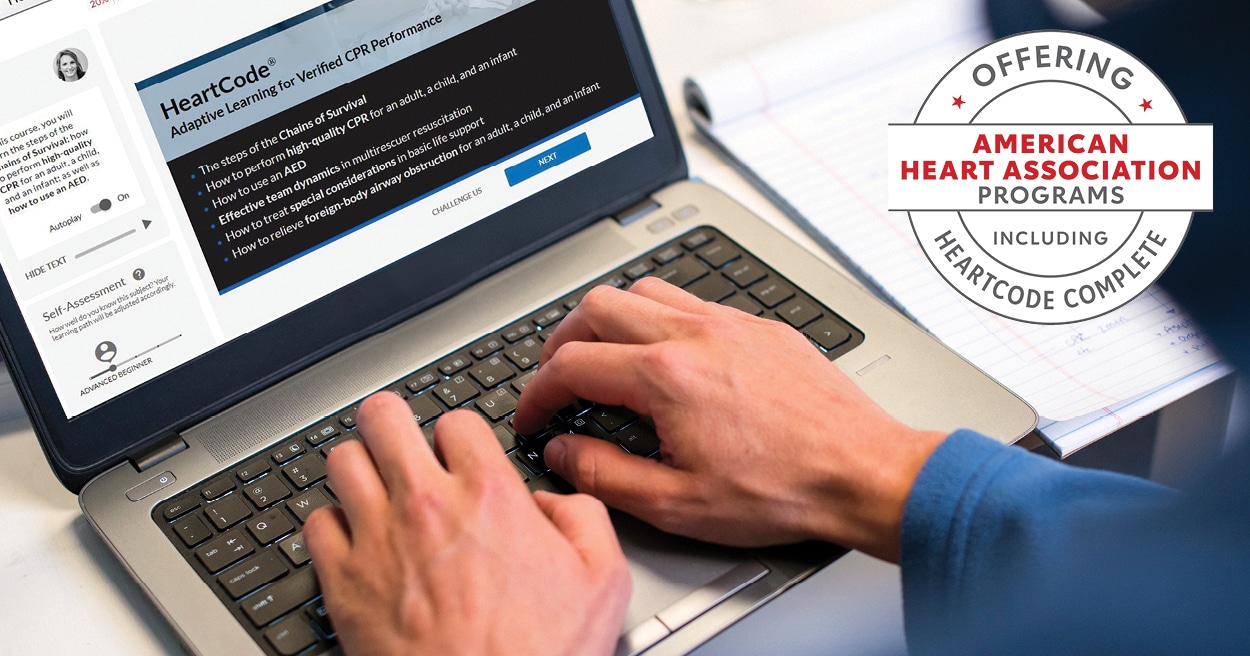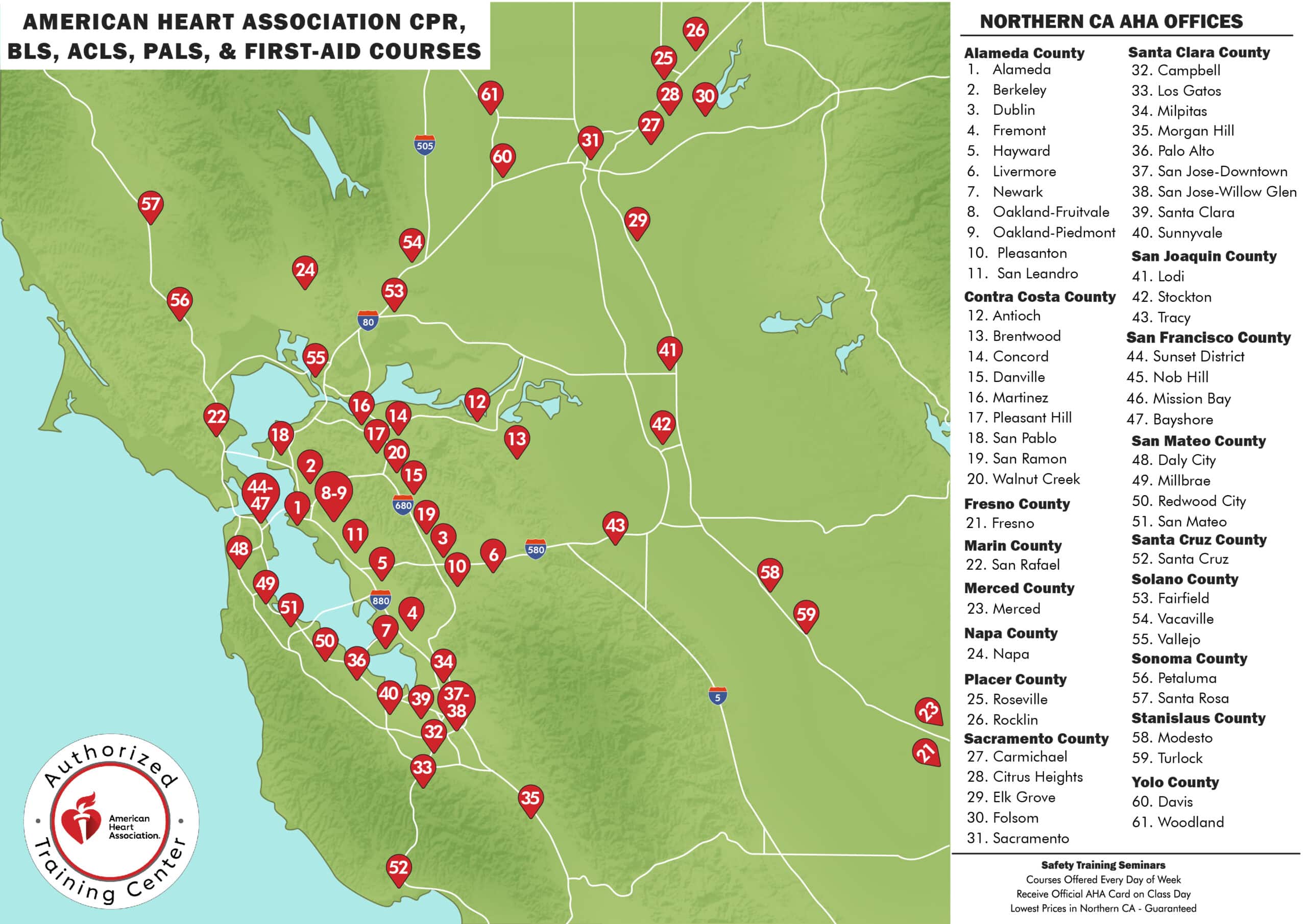American Heart Association© PALS Certification Classes in Lodi

American Heart Association© PALS
Course Name: PALS Pediatric Advanced Life Support (Initial or Renewal)
Online Course Length: 3-4 hours (At your home.)
Skills Testing: 30-40 minutes (At one of our over 60 testing sites.)
Price: $290 (This includes the online PALS course, skills testing, & PALS card.)
Certification: American Heart Association© PALS certification card.
When: PALS classes are offered Monday – Sunday from 7 am to 6 pm
Card Issuance: You will receive the PALS certification card on day of class.
Add ons available: ACLS, BLS, First-aid, Opioid, or Bloodborne Pathogens
Low Price Guranetee: Lowest Prices in Lodi, CA. Price matching policy.
View Upcoming PALS Courses in Lodi
Registration: View PALS Courses in Lodi Or Another City Near You

- 420 E Kettleman Ln, Suite 3-CS21-A, Lodi, CA 95240
- (209) 414-1030
American Heart Association PALS Classes: Essential Pediatric Emergency Training in Lodi
In Lodi, California, where healthcare providers are committed to delivering high-quality, comprehensive care, having trained professionals equipped to handle pediatric emergencies is essential. The American Heart Association (AHA) Pediatric Advanced Life Support (PALS) classes provide specialized training that empowers healthcare workers to respond swiftly and effectively to life-threatening situations involving infants and children. PALS training goes beyond basic CPR, focusing on the unique needs of young patients in crisis, which is crucial in a setting where specialized pediatric care can make all the difference.
In this article, we will explore the importance of PALS classes in Lodi, highlighting the training content, the benefits of certification for healthcare professionals, and how these courses contribute to a safer, better-prepared community.
Understanding the Need for Pediatric-Specific Emergency Training
Pediatric patients require a different approach to emergency care compared to adults. Their smaller bodies, varying stages of development, and different physiological responses mean that healthcare providers need specialized skills and knowledge to deliver effective care. PALS classes are designed to provide these skills, covering critical areas such as advanced airway management, recognition of pediatric shock and respiratory distress, and age-appropriate life-saving techniques.
In Lodi, where healthcare providers serve a diverse community with families and young children, PALS certification ensures that providers can confidently manage pediatric emergencies. This training is especially valuable for professionals working in emergency rooms, pediatric clinics, intensive care units, and urgent care centers.
What AHA PALS Classes Cover
American Heart Association PALS classes offer in-depth training that prepares participants to address a range of pediatric emergencies. The PALS curriculum includes the following key components:
Systematic Pediatric Assessment: Participants learn a systematic approach to assessing and evaluating pediatric patients. The training includes identifying the symptoms and severity of respiratory distress, shock, and cardiac arrest to ensure quick and accurate diagnosis and response.
Pediatric-Specific CPR and AED Use: PALS classes emphasize effective CPR techniques adapted specifically for infants and children. This includes chest compression depths, ventilation rates, and AED settings tailored to pediatric physiology to maximize the effectiveness of resuscitation efforts.
Advanced Airway Management: Airway issues are among the most common emergencies in pediatric care. PALS training covers advanced airway management techniques, including the use of bag-mask devices, endotracheal intubation, and other strategies to ensure that pediatric patients receive adequate oxygenation in emergencies.
Recognition and Management of Shock: Shock can present differently in pediatric patients than in adults. PALS training teaches healthcare providers how to recognize the various types of pediatric shock—hypovolemic, cardiogenic, distributive, and obstructive—and administer appropriate treatments to stabilize the patient.
Medication Administration for Pediatrics: Administering medication to children requires careful attention to dosage, age, and body weight. PALS classes include training on pediatric-specific medications and the appropriate protocols for delivering life-saving drugs during emergencies.
Effective Resuscitation Team Dynamics: Pediatric emergencies often require a coordinated effort among multiple healthcare professionals. PALS training emphasizes the importance of clear communication, role definition, and team dynamics during pediatric resuscitation efforts to ensure optimal outcomes.
The Benefits of PALS Certification for Healthcare Professionals in Lodi
For healthcare professionals in Lodi, PALS certification is an invaluable credential that enhances their ability to deliver specialized, high-quality care in emergency situations. Some of the benefits of obtaining PALS certification include:
Expanded Career Opportunities: Many hospitals, pediatric clinics, and emergency care facilities require or highly prefer candidates with PALS certification. In addition to broadening job prospects, PALS certification demonstrates a commitment to pediatric care excellence, making certified professionals stand out in their field.
Increased Confidence in Pediatric Emergencies: Handling pediatric emergencies can be intimidating, especially given the unique needs of young patients. PALS training provides healthcare providers with the confidence and skills they need to manage these critical situations effectively, helping them feel better prepared to act in high-stress scenarios.
Improved Patient Outcomes: Studies show that prompt and well-coordinated responses significantly improve survival rates and recovery for pediatric patients. PALS-certified professionals are trained to act quickly and accurately, reducing response times and improving the overall quality of care for children facing life-threatening situations.
Enhanced Community Safety and Trust: When healthcare providers in Lodi are well-equipped to handle pediatric emergencies, it builds community trust and safety. Families can feel reassured knowing that their healthcare providers have the skills necessary to care for their children during emergencies.
Accessibility of PALS Classes in Lodi
A key benefit of American Heart Association PALS classes is their accessibility. PALS training is offered through various hospitals, community health centers, and medical training facilities across Lodi, ensuring that healthcare providers can access this critical training close to home. For those with busy schedules, flexible options are often available, including online learning modules combined with in-person skills sessions. This hybrid approach makes it easier for healthcare professionals to fit PALS certification into their routines without sacrificing the quality of their training.
In addition, some employers in Lodi offer PALS certification programs for their staff, covering the cost of training and ensuring that all team members are up-to-date on the latest life-saving techniques.
How PALS Certification Benefits the Lodi Community
PALS certification benefits not only individual healthcare providers but also the entire Lodi community. By equipping professionals with pediatric emergency skills, PALS training enhances the overall quality of care available to children in the area. This is especially important in emergencies, where having a team of trained professionals who can deliver rapid, effective care can make all the difference between life and death.
In schools, childcare facilities, and other community settings where children gather, knowing that local healthcare providers have PALS training gives peace of mind to families and caregivers. The presence of PALS-certified professionals ensures that, even in the event of a serious pediatric emergency, young patients will receive immediate, specialized care tailored to their needs.
Conclusion: Why PALS Certification Matters in Lodi
In a community like Lodi, where families are at the heart of the city, providing healthcare professionals with the training they need to care for children in emergencies is invaluable. The American Heart Association’s PALS classes empower healthcare providers to respond to pediatric emergencies with skill, confidence, and precision, ultimately leading to better patient outcomes and a stronger, more resilient healthcare system.
For healthcare providers looking to make a difference in the lives of young patients, PALS certification is more than just a credential; it’s a commitment to delivering the highest quality of care in the most critical situations. By participating in PALS training, Lodi healthcare professionals play a vital role in safeguarding the community’s children and building a future where every child has access to timely, specialized emergency care.
Whether you are a medical professional looking to expand your skills or an employer aiming to enhance your team’s pediatric care capabilities, American Heart Association PALS classes in Lodi provide the expertise, practical skills, and confidence to handle pediatric emergencies effectively. This training not only supports individual career growth but also contributes to a safer, healthier community for all residents.
FAQs
Who should attend PALS certification classes in Lodi?
PALS certification classes are primarily designed for healthcare professionals who are involved in the management of pediatric patients, including pediatricians, emergency physicians, nurses, paramedics, and respiratory therapists.
How long does a PALS certification course typically last?
PALS certification courses usually span over two days, with a combination of didactic instruction, skills practice, and simulated scenarios to ensure comprehensive learning and skill mastery.
Is there a renewal requirement for PALS certification?
Yes, PALS certification is typically valid for two years, after which healthcare professionals are required to undergo PALS renewal courses to maintain their certification.
